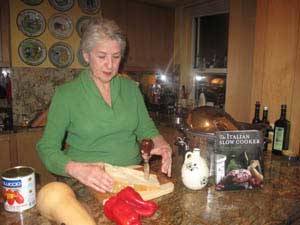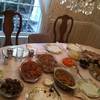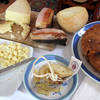An Italian Kitchen in Gramercy
Stepping in Michele Scicolone's apartment, located right in the heart of Gremercy, NYC, makes you feel like you are entering a cozy Italian nest, far away from the crowds and noise of the city. The lights are soft, and the table just at the right of the door looks like it is waiting to be set for a friendly dinner. The open kitchen on the left features dozens of hand-painted Italian porcelain plates decorating the wall, and overlooks the small terrace, where Michele cultivates, among the rest, Italian basil and lemons, giving it the smell of a garden in Sorrento.
She welcomes us with a smile as we sit in the cozy living room with her newest book, "The Italian Slow Cooker", placed on a side table right next to us.
Michele is the successful writer of 15 cookbooks, some of which are bestsellers; she holds cooking classes in New York and maintains two blogs, one of which is on i-Italy, sharing with her readers her passion for Italian cuisine.
This interview is meant not only to introduce you to our Food and Wine editor and her latest work, but also to share with all of our readers the story of a true Italian-American who grew up in Bensonhurst, Brooklyn, the Italian-American neighborhood par excellence. Michele always felt a strong connection to her heritage and chose to carry on an "Italian way of life" as hard as it might be in a city like New York. She dedicates much of her time to writing about and researching Italian food, observing its evolutions both in Italy and America.
Here is our nice chat...bon appetit!
So, let's start from "the end". How did you come up with the idea of writing the "Italian Slow Cooker"?
Well, Slow Cookers are very popular in the United States. I was in Italy and I saw "a fiasco" with cooking beans in a restaurant's window. Every time I passed the restaurant there would be this fiasco and they would serve the beans in the evening. That's when I thought to myself" Well, that's like the original slow cooker". Nowhere in Italy had I seen an electric slow cooker or a crock pot, but I realized that there are so many Italian dishes that are cooked for a long time, slowly, and they taste best that way. So I decided to adapt some of those recipes to the slow cooker. I bought one and the first thing I did is try it with those beans. And they really were the best beans I have ever made.
What kind of recipes we can find in your book?
There are all kinds of foods that I thought could be adapted to the slow cooker. There are a lot of soups made with legumes and beans, vegetables, and they are all from different regions of Italy. Then I talk about polenta, which turns out great in the slow cooker. And that's something that I would have never expected! Then there is a section on fish that emphasizes attention when cooing it because it can overcook so quickly. But, for example, if you are preparing a fish stew, you can prepare the base for the soup and then just add the seafood at the last minute and cook it for a short period of time. It comes out perfectly. Then in another section there are plenty of meats because slow cooking is the ideal way to prepare tough-cut meats like shoulder, ribs, and shanks: it really melts the connecting tissue down and meats come out really tender, and fall off the bone. Finally, I experimented with desserts...
Can you really prepare sweets in the slow cooker?!
Yes, it was really interesting to discover how tasty a cheesecake is when prepared in the slow cooker. It keeps all the moisture in, and cooks very evenly and at a high temperature. So if you cook a cheesecake with that it doesn't crack or overcook. In the book I also propose recipes of custard sweet cakes, flour-less chocolate cakes, and fruit cakes. They are delicious.
How long did it take you to put all these recipes together?
It took me about a year to put together the 125 recipes of the book. I do a lot of traveling, writing, and teaching too. So in some periods I could not work on it, but there were days in which I planned to work on 5-6 recipes, so I bought the ingredients and started working on them. It took me an average of a couple of days to get to the desired result, and another couple to write them down and organize them.
You always convert Italian measures into American ones, and that's an important part of your work, since it makes it easier for your readers to follow the recipe. Did you do it for this book?
In this case I didn't start from Italian original recipes, but I took most of the recipes from my past cookbooks. So they were already transcribed in American measures and weights. Also, I don't think that you can typically take an Italian recipe and just recalculate it in ounces and pounds and have it work exactly the same way. There are ingredients that are very different, so you have to test them and make adjustments.
Why is the slow cooker not so famous in Italy?
I don't know. Italians have some wonderful gadgets that I have never seen here in America, such as the electric polenta maker, but they do not have the slow cooker. Instead, it would be perfect for them since it consumes very low energy and cooks food the "Italian way". However, even if you don't own one, you can adapt most of these recipes to the stove or the oven.
Why should an American cook use the slow cooker?
Well, because it's a great way to cook healthy comfort meals, including Italian ones. Plus, it gives the cooker a chance to do ten thousand things while the food is cooking. You can put the food in, go out all day long, without standing there and fussing over it, and when you come back you find it ready for dinner. Or, another example, you can start the slow cooker before going to bed, and find the soup ready in the morning, refrigerate it, and warm it up at dinner time.
How much do you use it in your daily life?
I use it several times a week I would say. This week I just made a big bunch of chicken soup, because I was feeling a cold coming on. It was easy and I could refrigerate what was left over for another meal.
This is the last book you wrote. Among all of those you wrote before, to which one do you feel more attached?
That's like saying "which of your children is your favorite!" You put your heart and soul into each one of them... But if I really have to choose, I have a couple of real real favorites. My book 1000 Italian recipes was a book I worked on for a number of years, it took a lot of effort. I refer to it all the time, it is kind of my Bible whenever I need an idea, or I have company. And then, First taste of Italy was kind of a break-through book for me because I was able to put into it a lot of the things I discovered while traveling around Italy that I had not yet seen in this country.
Where does your passion for cooking come from?
It comes from my family and my Italian-American heritage. My father's family is from the island of Procida, and my mother's is from outside of Naples, Afragola. Both of my parents were very good cooks. I grew up in Bensonhurst, Brooklyn, the Italian-American neighborhood par excellence and my dad had a grocery business, a delicatessen. Food was a very important part of our life; it characterized every holiday and occasion, even the sad ones. The food could be part of the celebration or the consolation. We ate well every day, and we would have big parties with all of our relatives and friends.
What is the traditional meal that reminds you the most of your time together with your family?
My mother took on a lot of the recipes from my father's mother, to "please her husband" (that was the way the Italian women thought in those days). My grandma used to make la "genovese", and it was always a special dinner for us on holidays. There was a particular pasta shape that she would make to go with the sauce. And I also remember the smell of my grandma's pastiera... it was out of this world. She passed the recipe to me and I still make it every year for Easter.
What is your favorite Italian recipe?
Oh, this is a very hard question! If I really have to choose, maybe I would go for a very simple tomato sauce made with good tomatoes, olive oil and garlic. It is fast, delicious, and always sathisfying. It is probably the best meal I can think of.
You teach cooking classes. What is the first thing you tell your students about Italian cuisine?
To keep it simple. It is not about the secret herbs and spices, or lots of garlic. But unfortunately that's what Americans think it is all about. One herb will do...
What kind of people come to your lessons?
It's amazing to see so many different kinds of people coming. There were some from Syracuse, Texas; some read my books already and followed my career; and others came just because they liked the topic of the class. It is always fun though, because you can see that they are all people who love to eat. They love Italian cooking because it is simple to make and affordable. I guess that when they watch food channels and see cooking demonstrations they feel discouraged by the richness of the ingredients and the preparation some recipes require. They must think "I will never be able to make this". With Italian food it is different, all you need is 3-4 ingredients and a sprinkle of love for food.
What is the future of Italian cuisine in America?
I think it has a brilliant future. It may not be the same food you can find in Italy but that's OK... In my "Fresh Taste of Italy" I talk about America as the 21st culinary region of Italy, because we love Italian food and cook it. We don't cook it as they would in the different regions of Italy, but in our way. That's because we have access to very different ingredients, and we have many more influences on our taste - we live in such a melting pot!
You also travel a lot to Italy. Do
you think Italian cuisine there is changing?
How?
Yes, it is changing a lot. It's amazing to see the changes that are taking place. A lot of chefs are adapting ingredients that I never saw them using before. Young chefs I see today say "We don't want to cook the old way anymore, we don't want to follow tradition. I don't cook like my grandma cooked. I went to France and Japan, and I want to bring in new influences". Also, there is a great influx of immigrants that are bringing in their flavors, and many work in restaurants. I think that these changes can be very dangerous. It is important to save your roots, and the culture and tradition.
A number of years ago, when I was writing my Italian Holiday Cooking, I asked people "So, it's Christmas. What is the traditional recipe your family makes on this occasion?" I can't tell you how many times they answered something like "We buy some ravioli at the pasta store. We don't have time to make those dishes; we don't cook anymore the way our grandma used to". I found it very sad.
One traditional dish you really love is pizza. You wrote a book about it with your husband Charles...
We first went to Naples in the 1970s and returned in the mid-1990s. On that second trip we had an amazing time. The city was beautiful, clean, people were very helpful, and the restaurants were superb. We had pizza at least twice a day, in the streets, in the restaurants... I felt an affinity with the people, and we found everything very enjoyable. On our way back home on the plane, Charles said "When are we going to get pizza like that in NY?". So I teased him answering "Oh, you have to make it yourself!". Sure enough, he started experimenting, reading and researching, until he finally made a good home-made pizza. Our editor thought it was a great subject to write about, and so we came up with our Pizza Book, with lots of different recipes and tips. We had a lot of fun working together.
Beside writing books, you also maintain your own blog. How does it differentiate from the thousands cuisine blogs you can find on the web?
There are so many voices out there speaking and expressing their opinions on Italian cuisine. There is no way to verify them, and that's the real problem with blogging. Some of them are accurate and excellent, but others are just a disaster. Anyone approaching a blog should find out a little bit about who's writing there, if he/she ever went to Italy, or has any kind of personal or professional experience with Italian cooking. Since I have been traveling in Italy for 40 years, and I am Italian-American, I can share with my readers "something more" about the national cuisine, the way to live it, the "religious", geographical, and historical aspects of the food...
The good thing about blogging is that you are free to write whatever you want. If I wanted to talk about some unknown cheese from Basilicata, I can do it without worrying of having trouble selling the story to a magazine.
So, what's coming next?
I want to go back to Italy as soon as possible...discover, taste, research... I already have another book in mind, and I think that a trip like that will give me the right inspiration to start writing again!
Michele Scicolone is a cookbook author and writer who specializes in food, wine and travel. She is the author of 15 cookbooks.The latest, published by Houghton Mifflin is The Italian Slow Cooker. The BLT Cookbook, co-authored with chef Laurent Tourondel, was nominated for a 2007 James Beard Award. Entertaining with the Sopranos was published by Warner Books in 2006. Her previous book, The Sopranos Family Cookbook, co-authored with Allen Rucker, was a Number One New York Times bestseller published in 9 languages.
She authored several books for Williams Sonoma including Savoring Italy, Essentials of Italian Cooking, and Mastering Pasta. Her book 1,000 Italian Recipes was nominated for a 2004 James Beard Award and was a main selection of The Good Cook book club. Italian Holiday Cooking (Morrow) was chosen as one of the Top Ten Cookbooks of the year 2001 by Food & Wine magazine. Michele is also the author of Savoring Italy, published in 1999 by Williams Sonoma and Time Life. Pizza--Anyway You Slice It! was co-authored with her husband Charles and published in 1998 by Broadway Books. The book received high praise in a New York Times review. A Fresh Taste of Italy was nominated for a Julia Child Award as the Best Italian Cookbook of 1997 by the International Association of Culinary Professionals and was chosen as one of the ten best cookbooks of the year by Amazon Books.
La Dolce Vita, a collection of recipes for "life's sweet pleasures" Italian desserts, was nominated as the Best Dessert Book of 1994 by the International Association of Culinary Professionals. Her previous book, The Antipasto Table, was nominated by the James Beard Foundation as Best Italian Cookbook of 1991.
Michele’s articles have appeared in Bon Appetit, The Los Angeles Times, The Washington Post, The Wine Spectator, The New York Times, Gourmet, Cooking Light Eating Well, Prevention, and many other publications. Television appearances include Emeril Live, The CBS Morning Show, Good Morning America, and Cooking Live, as well as many local television and radio programs.















































i-Italy
Facebook
Google+
This work may not be reproduced, in whole or in part, without prior written permission.
Questo lavoro non può essere riprodotto, in tutto o in parte, senza permesso scritto.